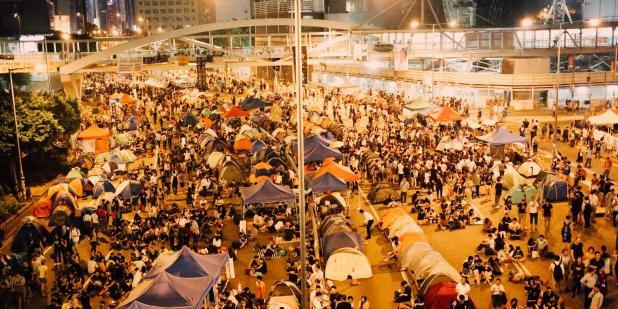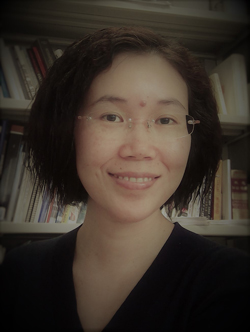|
Please join the USC U.S.-China Institute for a talk by visiting scholar Roselyn Du to examine how the Occupy Central in Hong Kong was presented in the news coverage by U.K., U.S., Hong Kong, Taiwan, and mainland China media.
A Movement Of Varying Faces:How "Occupy Central" Was Framed In The News
Date:Thursday, November 9, 2017
Time:4:00-5:30pm
Location:Annenberg School for Communication & Journalism, ASC 207
Free, RSVP here.
|

|
|
Photo credit:Craig Stubing |
The 2014 Occupy Central crisis in Hong Kong is seen as China's biggest political struggle since June 4, 1989 and the government crackdown on the pro-democracy "Beijing Spring" movement. The Occupy Central protests, also known as the "Umbrella Movement," combined with its backdrop of different political climaxes in the three regions of Greater China and in the Western world, provides an extraordinary platform for a news framing study, as it involves political aspirations toward democracy, something that is valued and sensitized to varying degrees among different media systems. The conflicts between the protesters and the established rulers during the crisis allowed news media to adopt a variety of frames that are congruent with their political and social values.
Using frames derived from past studies and identified from original data, this study examines how Occupy Central was presented in the news coverage by U.K., U.S., Hong Kong, Taiwan, and mainland China media, and analyzes the frames exerted on the coverage. The newspapers studied in all five media markets were found to have constructed their coverage within the ideological boundaries prevailing in their respective societies. This resulted in differing portrays of the same event or the same issue. The findings show significant differences not only between contrasting media systems, but also between comparable ones. In the talk, Dr. Du will share her research findings and interpret the frames employed in the coverage in terms of the markets' ideological differences. She will also explore the reasons for these differences and theoretical implications.
About the Speaker
|

|

|
Y. Roselyn Du is an Associate Professor at Hong Kong Baptist University School of Communication. She received her PhD from the University of North Carolina at Chapel Hill and her MS from North Carolina State University. Before receiving academic training in the United States, she was an awarding-winning forefront journalist in China. She has published in Journalism and Mass Communication Quarterly, Journalism and Mass Communication Educator, Global Media and Communication, International Journal of Communication, International Communication Research Journal, among others.
Screening:Vanished Archives
Date:Friday, November 3, 2017
Time:4:00-5:30pm
Location: Annenberg School for Communication & Journalism, ASC 204
Free, RSVP here.
|

|
|
photo credit:Vanished Archives |
About the Film
The 1967 riots are a watershed in Hong Kong history and some would say the starting point for the development of Hong Kong consciousness. Yet the official records of this critical period today are sadly incomplete. What information can be found online is hard to verify and authenticate. Documentary film director Connie Lo Yan-wai spent four years interviewing participants of the riots, from the children of the leftist leaders of the time, to members of the "bomb squads", union leaders and patriotic students. Others who share their personal experiences include former police officers, a senior government information director, journalists and a number of witnesses and victims. Lo sifted through piles of old newspapers, government documents and declassified British government records in order to produce the documentary, Vanished Archives. As a number of those who experienced the events of the time passed away during the four years it took to produce the film, the documentary has become their final record of their recollections of and reflections on those times. Are the political entanglements between the Mainland and Hong Kong fifty years ago a mirror reflecting today's Hong Kong? Some maintain traces of the past can be detected in the present.
Ching Cheong, a veteran journalist based in Hong Kong, will provide prescreening comments.
The film(click here to watch the trailer)is 119 minutes long and will be screened in Cantonese with English subtitles. Discussion with the director follows the screening.
Over the past two decades, Connie Yan-wai Lo worked in different media groups including the TV Division of Radio Television Hong Kong, the News and Public Affairs Department of Asia Television Limited, Fairchild TV in Canada and the News and Public Affairs Department of Television Broadcasts Limited. She has founded Studio for Public Humanities Limited in 2012 with a focus in history documentation.
Avoid traffic and get to USC by taking the Metro's Expo Line
Get off at the Expo Park/USC stop for a short walk to campus. Click here for more information.
Driving Directions to Campus
For maps and directions to campus, visit the University Park Campus Map & Driving Directions page.
Suggested Parking
McCarthy Way Parking Structure(Formerly Parking Structure X)- $12/day
Enter at the Figueroa Street Entrance at McCarthy Way(Formerly Entrance 3) | 
















